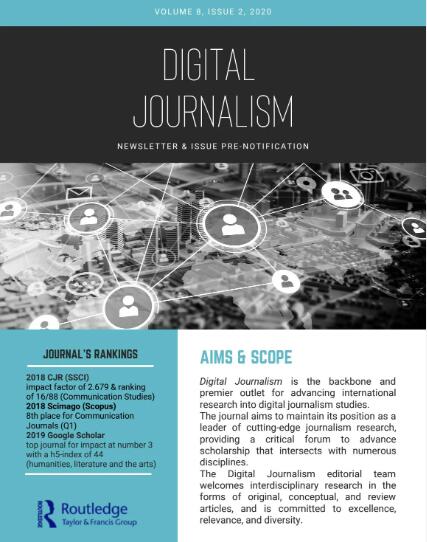分析推特上的新闻煽情主义(X):传统新闻与网络原生新闻的点击诱饵新闻以及对用户参与的影响
IF 5.4
1区 文学
Q1 COMMUNICATION
引用次数: 0
摘要
随着人们越来越多地通过社交媒体获取新闻,新闻消费模式也发生了变化。这种变化的一个副产品就是 "点击广告 "的兴起--这是一种利用感官刺激来吸引眼球的新闻形式。本文章由计算机程序翻译,如有差异,请以英文原文为准。
Analyzing Sensationalism in News on Twitter (X): Clickbait Journalism by Legacy vs. Online-Native Outlets and the Consequences for User Engagement
News consumption patterns have evolved as people increasingly get news through social media. A by-product of this change has been the rise of “clickbaits”—a form of journalism that utilizes sensati...
求助全文
通过发布文献求助,成功后即可免费获取论文全文。
去求助
来源期刊

Digital Journalism
COMMUNICATION-
CiteScore
11.20
自引率
24.10%
发文量
103
期刊介绍:
Digital Journalism provides a critical forum for scholarly discussion, analysis and responses to the wide ranging implications of digital technologies, along with economic, political and cultural developments, for the practice and study of journalism. Radical shifts in journalism are changing every aspect of the production, content and reception of news; and at a dramatic pace which has transformed ‘new media’ into ‘legacy media’ in barely a decade. These crucial changes challenge traditional assumptions in journalism practice, scholarship and education, make definitional boundaries fluid and require reassessment of even the most fundamental questions such as "What is journalism?" and "Who is a journalist?" Digital Journalism pursues a significant and exciting editorial agenda including: Digital media and the future of journalism; Social media as sources and drivers of news; The changing ‘places’ and ‘spaces’ of news production and consumption in the context of digital media; News on the move and mobile telephony; The personalisation of news; Business models for funding digital journalism in the digital economy; Developments in data journalism and data visualisation; New research methods to analyse and explore digital journalism; Hyperlocalism and new understandings of community journalism; Changing relationships between journalists, sources and audiences; Citizen and participatory journalism; Machine written news and the automation of journalism; The history and evolution of online journalism; Changing journalism ethics in a digital setting; New challenges and directions for journalism education and training; Digital journalism, protest and democracy; Journalists’ changing role perceptions; Wikileaks and novel forms of investigative journalism.
 求助内容:
求助内容: 应助结果提醒方式:
应助结果提醒方式:


